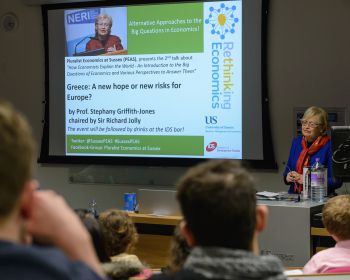Broadcast: News items
Greece: New hope or new risks for Europe?
Posted on behalf of: Mar Maestre (Research Officer, IDS Business Markets and States Cluster) and Henry Tugendhat (Research Officer, IDS Rural Futures Cluster) both members of Pluralist Economics at Sussex (PEAS) society
Last updated: Friday, 17 April 2015

These first months of 2015 have been filled with many questions for the Eurogroup. The Greek elections, held on 25 January, had everyone on tenterhooks about the implications of its outcome.
News outlets reinstated the word ‘Grexit’ (a term coined in 2012, to refer to the potential of Greece leaving the Eurogroup) with forecasts that it may be imminent. Quoting Greenspan ‘I believe [Greece] will eventually leave. I don't think it helps them or the rest of the eurozone…’. For many though, Syriza’s victory signifies the start of a new era, and the firm belief that austerity is not the only way out of the present crisis.
How Economists Explain the World
To shed some light on this new terrain that Greece and the Eurozone are entering, the Pluralist Economics at Sussex (PEAS) society (member of the Rethinking Economics network), invited Professor Stephany Griffith-Jones to give a talk in Sussex entitled ‘Greece, New Hope or New Risks for Europe?’. A long-term fellow of IDS specialising in financial crises, development finance and reform of the international financial system, she is now the Financial Markets Program Director at Columbia University’s ‘Initiative for Policy Dialogue’ .
The talk, chaired by former IDS Director, Sir Richard Jolly, is the second in the PEAS speaker series ‘How Economists Explain the World - An Introduction to the Big Questions of Economics and Various Perspectives to Answer Them’. Students and staff of Sussex established the group to promote pluralism in economics education and this speaker series hopes to show that by learning about a range of schools of thought we might better understand the world we live in.
Consequences of the crisis
Drawing on a New-Keynesian analysis, Professor Griffith-Jones brought out some of the bigger points at stake in the debates around Greece’s economic recovery from the 2008 financial crisis. This focused on arguments for and against austerity and looked more generally at policy implications for the Eurozone. She argued that the main lesson we should learn from this crisis is that ‘we need a radical rethinking of the desirable size, structure and regulation of the financial sector’.
Stiglitz, Easterly and Islam argued in 2000 that the financial sector’s optimal size is of 80-100% ratio of credit to private sector/GDP, before it becomes dysfunctional. The logic being that too big a financial sector has increased volatility as well as imbalances in political power. For instance, the US has a 200% ratio and the UK a 155%, so when the crisis hit in 2008, the notions of ‘too big to fail’ or ‘too big to bail’ became the norm, introducing also the problem of ‘too big to regulate’. This inefficient allocation of assets not only concerns funding, but also talented people such as the large numbers of UK science and engineering PhD graduates who go on to work in the City.
Furthermore, the consequences of this crisis for Greece are beyond financial, they are breaking the country’s social fabric, with more than 40% of children living in poverty, unemployment rates of 55% for people under 35, and a one quarter loss of its GDP in the last 6 years. Griffith-Jones argued how the draconian austerity measures imposed by the Troika are costing Greece its country, while unlikely to solve these very pressing social issues any time soon, will in fact most likely worsen them.
So, what is the alternative?
The talk concluded with a discussion of the alternative policy options that Syriza has at its disposal. Based on a Keynesian analysis she argued that deficit countries should not simply be forced to cut, but rather, surplus countries should also be forced to expand and spend - previously argued by other economists, like Paul Krugman. Drawing on a letter she published in collaboration with other prominent economists such as Joseph Stiglitz, Robert Skidelsky and Frances Stewart, she recommended (i) printing more money as a short term solution; (ii) lower fiscal consolidation at a European level; (iii) having higher real wages and (iv) increasing the Junker Plan budget, that uses the European Investment Bank to finance SMEs and encourage investment.
Economics or Politics?
Noticeable throughout this talk though, was the acknowledgement that ‘politics’ is unavoidable in these ‘economic’ decisions. This shouldn’t be surprising, as it just reflects the fact that economics has always involved debate. Ultimately, the framework an economist uses to understand the world shapes the solutions they come up with thereafter. In the case of Greece, the outcome is that many neo–classical economists believe that austerity measures will result in a positive outcome, while others, such as Stephany Griffith-Jones, argue for alternatives like those explained above. Some might criticise the fact that these debates spill over into politics, but actually that’s just the point. No economic school of thought is ‘value-neutral’ and so to remove the existence of these debates from the economics classroom is tantamount to an intellectual lobotomy of the subject.
For this reason, our hope is that the next generation of policy-makers, business leaders, and individuals will not go through the same process of studying one school of economic thought through which to view the world, but understand the very rich tensions and contradictions within and between these landmark economic thinkers. This talk by Stephany Griffith-Jones made a solid step in the direction of opening up this debate on the University of Sussex campus, and we hope you’ll join us for the many more to come!
PEAS students and staff meet every Wednesday, at 6pm in the IDS bar. We hope to see you soon!
Follow Sussex PEAS on social media
- Twitter: @SussexPEAS
- Facebook: Pluralist Economics at Sussex

